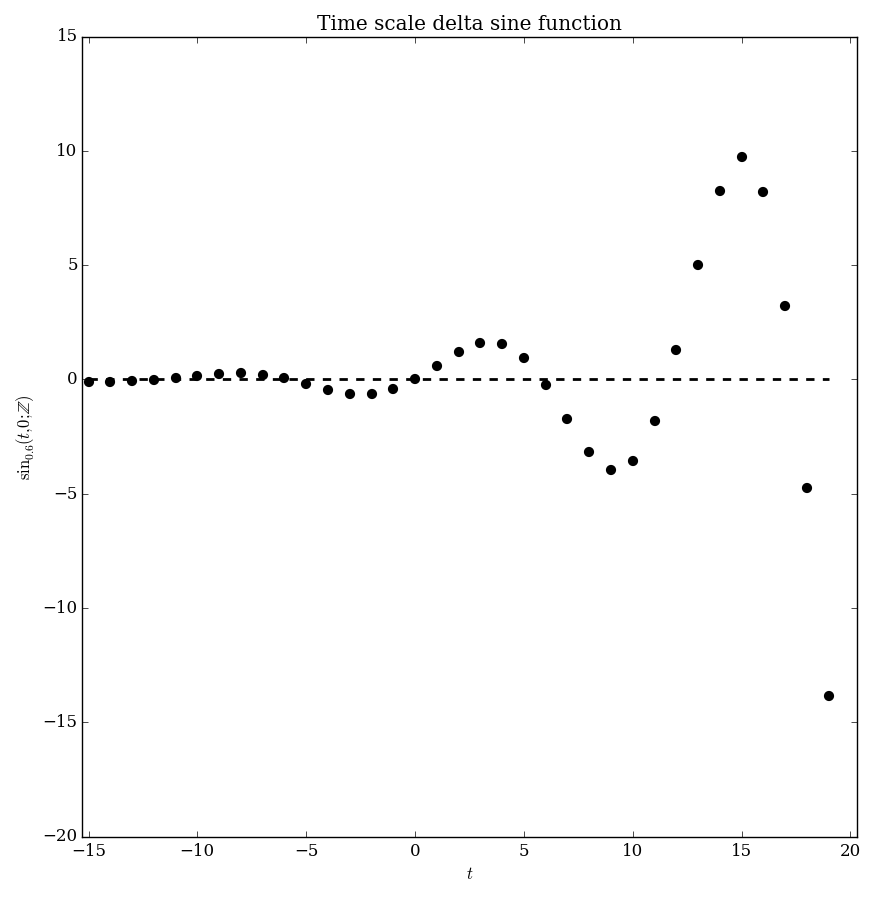Difference between revisions of "Delta sine"
From timescalewiki
| Line 1: | Line 1: | ||
| + | __NOTOC__ | ||
Let $\mathbb{T}$ be a [[time_scale | time scale]], let $s \in \mathbb{T}$, and let $\mu p^2 \colon \mathbb{T} \rightarrow \mathbb{R}$ be a [[regressive_function | regressive function]]. We define the trigonometric function $\sin_p \colon \mathbb{T} \times \mathbb{T} \rightarrow \mathbb{R}$ by | Let $\mathbb{T}$ be a [[time_scale | time scale]], let $s \in \mathbb{T}$, and let $\mu p^2 \colon \mathbb{T} \rightarrow \mathbb{R}$ be a [[regressive_function | regressive function]]. We define the trigonometric function $\sin_p \colon \mathbb{T} \times \mathbb{T} \rightarrow \mathbb{R}$ by | ||
$$\sin_p(t,s)=\dfrac{e_{ip}(t,s)-e_{-ip}(t,s)}{2i}$$ | $$\sin_p(t,s)=\dfrac{e_{ip}(t,s)-e_{-ip}(t,s)}{2i}$$ | ||
| Line 13: | Line 14: | ||
[[Derivative of Delta sine]]<br /> | [[Derivative of Delta sine]]<br /> | ||
[[Sum of squares of delta cosine and delta sine]]<br /> | [[Sum of squares of delta cosine and delta sine]]<br /> | ||
| − | + | [[Derivative of delta cosine]]<br /> | |
| − | |||
| − | |||
=Examples= | =Examples= | ||
Revision as of 01:59, 10 June 2016
Let $\mathbb{T}$ be a time scale, let $s \in \mathbb{T}$, and let $\mu p^2 \colon \mathbb{T} \rightarrow \mathbb{R}$ be a regressive function. We define the trigonometric function $\sin_p \colon \mathbb{T} \times \mathbb{T} \rightarrow \mathbb{R}$ by $$\sin_p(t,s)=\dfrac{e_{ip}(t,s)-e_{-ip}(t,s)}{2i}$$
Properties
Derivative of Delta sine
Sum of squares of delta cosine and delta sine
Derivative of delta cosine
Examples
| $\mathbb{T}$ | $\sin$$_p(t,s)= $ |
| $\mathbb{R}$ | |
| $\mathbb{Z}$ | $\dfrac{\displaystyle\prod_{k=t_0}^{t-1}1+ip(k) - \displaystyle\prod_{k=t_0}^{t-1}1-ip(k)}{2i}$ |
| $h\mathbb{Z}$ | |
| $\mathbb{Z}^2$ | |
| $\overline{q^{\mathbb{Z}}}, q > 1$ | |
| $\overline{q^{\mathbb{Z}}}, q < 1$ | |
| $\mathbb{H}$ |
$\Delta$-special functions on time scales | ||||||
$\cos_p$ |
$\cosh_p$ |
$e_p$ |
$g_k$ |
$h_k$ |
$\sin_p$ |
$\sinh_p$ |
